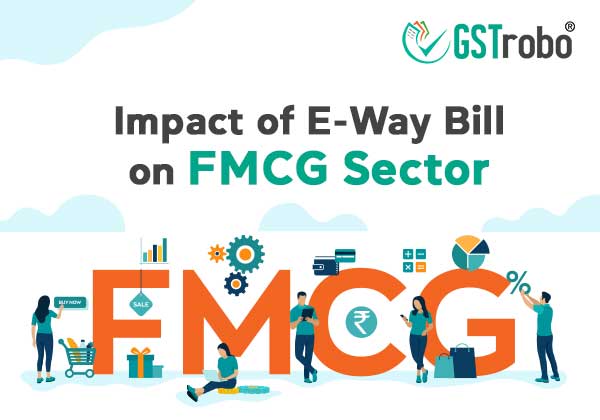Impact of E-Way Bill on FMCG Sector
FMCG is one of the main sectors in the Indian market that got benefitted due to the implementation of the e-way bill. Therefore, it becomes important to understand the impact of the e-way bill on the FMCG sector. Let us take you through the same in these 2 minutes read.

What is an E-Way Bill?
An E-way bill is a document that is generated by the taxpayer to supply goods or/and services from one place to another. As per the e-way bill provision, every taxpayer moving consignment having a value of more than INR 50,000 needs to generate an e-way bill.
Types of FMCG Companies
The FMCG sector operates in non-durable items with short to medium-term shelf life which is generally of lower value. Some of the examples of FMCG companies are:
- Processed foods such as cheese products, cereals, and boxed pasta.
- Prepared meals such as ready-to-eat meals, soups, and food.
- Baked goods such as bread, cookies, croissants, and bagels
- Fresh and frozen foods such as fruits, vegetables, frozen peas, and carrots
- Beverages, for instance bottled water, energy drinks, and juices.
- Medicines that can be purchased without prescription such as aspirin, pain relievers, and other medications.
- Cleaning products such as baking soda, oven cleaner, window, and glass cleaner.
- Cosmetics and toiletries, for example toothpaste, soap, hair oil, and other hair-care products.
- Office supplies, for instance pens, pencils, and markers
Impact of E-Way Bill on FMCG Sector
This is how the introduction of the e-way bill impacted the FMCG Sector:
- With the introduction of the e-way bill, the inter-state and intra-state movement of the consignment has smoothened due to the removal of barriers and check-posts.
- The removal of barriers and check posts has also lowered the time taken to deliver the consignment and reduced the supply chain cost.
- Using the sub-user functionality available under the e-way bill system, FMCG companies have created a controlled network within the organization. This feature enables the FMCG companies to assign roles to various employees so that they can monitor and manage different e-way bill facilities.
- Some FMCG companies supplying essential commodities need not generate an e-way bill as the compulsory INR 50,000 is not considered at the time of supplying.
- An E-Way bill is not required to be generated if the value of each consignment does not cross INR 50,000, even though the value of the entire consignment exceeds INR 50,000. This is particularly useful for FMCG companies which generally transport multiple consignments at the same time.
- For intra-state supplies, the FMCG companies do not have to furnish the details of the transporter if the distance is less than 50 Kms.
- FCMG companies can generate e-way bills in bulk using the Bulk generation Facility. With the help of this option, the user can generate or update multiple e-way bills with a single upload. This has increased efficiency and reduced the time taken to generate e-way bills.
- Major relief to the FMCG companies is that they need to generate e-way bill when the taxable value of supply exceeds INR 50,000. However, the value of non-taxable supply such as essential commodities is not considered at the time if generating an e-way bill.
